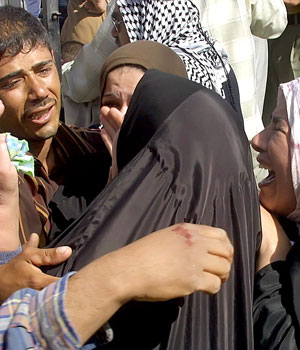
Iraqis mourns the death of two teenage boys who were killed in a roadside bomb in the town of Balad Ruz, northeast of Baghdad, 25 March 2006 (AFP)
MOSCOW (AP) – Russia’s Foreign Intelligence Service on Saturday denied that Moscow provided information on U.S. troop movements and plans to Baghdad during the 2003 invasion of Iraq.
“Similar, baseless accusations concerning Russia’s intelligence have been made more than once,” Foreign Intelligence Service spokesman Boris Labusov said, according to a duty officer in his department. “We don’t consider it necessary to comment on such fabrications.”
An unclassified Pentagon report released Friday cited two captured Iraqi documents that say the Russians collected information from sources “inside the American Central Command” and that battlefield intelligence was provided to then-Iraqi leader Saddam Hussein through the Russian ambassador in Baghdad.
The report also said the Russian government had sources inside the American military command as it planned and executed the invasion of Iraq in 2003.
Pavel Felgenhauer, a respected independent Moscow-based military analyst, said Friday that the report was within the realm of possibility.
“It’s quite plausible,” he told The Associated Press. He said a unit affiliated with the Defense Ministry’s Main Intelligence Department, known by its abbreviation GRU, was actively working in Iraq at the time of the U.S. invasion of Iraq. The unit apparently was shut down after the fall of Baghdad. He said at that time there was an Internet site in Russian called “The Ramzay Files” that caused a stir in Moscow’s military and diplomatic community. The site, which was shut down after the invasion, posted striking insights, predictions and analysis into U.S. military activities as well Iraqi military and intelligence activities, he said. He said former GRU officials told him that the type of information that was being posted, both on the Iraqis and on the Americans, appeared to be the kind of information that only highly placed Russian intelligence officials in Iraq would have had access to.
Russian intelligence officials repeatedly denied having any links with Iraqi spy services.

A picture released by the US Army 24 March 2006 shows Iraqi youth standing in line at a recruiting center in the restive city of Ramadi, west of Baghdad (AFP)

Iraqi Foreign Minister Hoshyar Zebari arrives at the conference hall in Khartoum, where preparatory meetings for next week’s Arab Summit meeting began 25 March 2006 (AFP)
